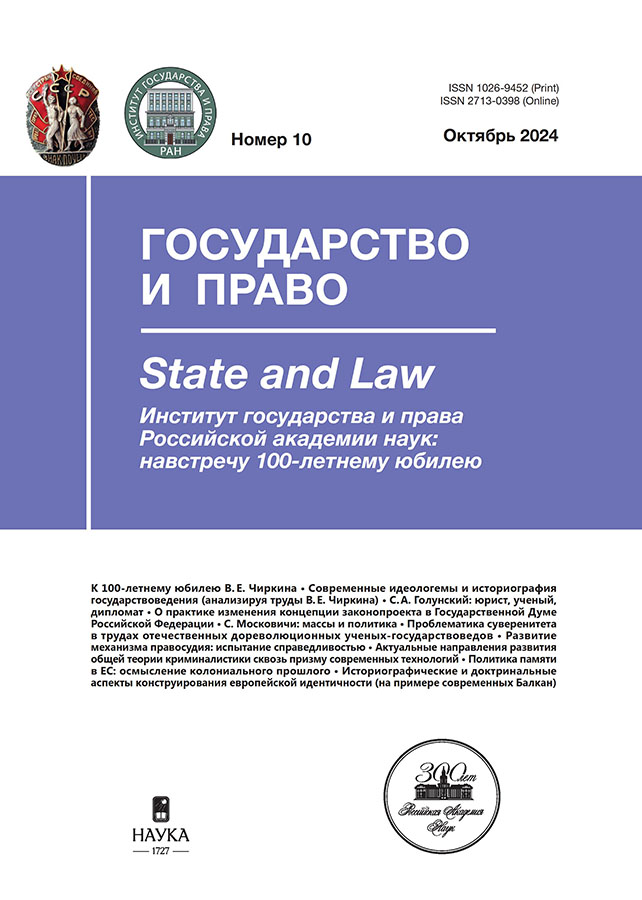The goal setting in law: the theoretical and methodological problems of substantive and procedural law
- Authors: Stepanenko R.F.1,2, Khamidullina F.I.1
-
Affiliations:
- Kazan (Volga Region) Federal University
- TISBI University of Management
- Issue: No 10 (2024)
- Pages: 45-54
- Section: Philosophy of law
- URL: https://rjmseer.com/1026-9452/article/view/649070
- DOI: https://doi.org/10.31857/S1026945224100052
- ID: 649070
Cite item
Abstract
The article analyzes the actual problem of modern jurisprudence – the goal-setting of law. Goal-setting as a doctrinally grounded, systematic and practice-oriented process precedes the formulation of goals in law, participates in the procedures for their legitimization in the normative legal space and accompanies the implementation of set goals throughout legal activity, in a particular area of legal regulation of public relations. Goal-setting in law is involved in norm-setting, legal realization, including law enforcement, and acquires special importance in conditions of uncertainty, instability of law and order, a high degree of conflict and risks of international legal relations, as well as threats to national, public and personal security. The actualization of the problems of goal-setting, being relatively in demand in scientific research of theoretical and sectoral jurisprudence, is primarily due to the need to argue tactics and strategies for building modern legal policy (law policy), without specifying the target reasons for improving which, the authority and effectiveness of rulemaking and legal implementation seem insufficiently effective. The functional expediency of formulating, formalizing and following the set goals has not only praxiological, but also axiological significance from the standpoint, first of all, of observing and protecting individual (personal) and collective human and civil rights and freedoms. Goal-setting in substantive and procedural law is translated to one degree or another through the presentation of norms-goals. norms are principles, norms are tasks, but they do not have a fully rationally justified systematization, which should initiate the scientific interest. Satisfaction of the interests and needs of the individual, society and the state balanced by law as a target setting (super task) of law, in conditions of a clear and rational definition of the goals of legislation, becomes important taking into account the peculiarities of modern legal reality, as well as for the future.
Keywords
Full Text
About the authors
Ravia F. Stepanenko
Kazan (Volga Region) Federal University; TISBI University of Management
Author for correspondence.
Email: stepanenkorf@yandex.ru
Doctor of Law, Professor of the Department of Theory and History of State and Law; Professor of the Department of Theory and History of State and Law
Russian Federation, Kazan; KazanFarida I. Khamidullina
Kazan (Volga Region) Federal University
Email: inbox7575@inbox.ru
Doctor of Law, Professor of the Department of Civil Law
Russian Federation, KazanReferences
- Baranov V. M. Changing legislation as a social trauma // Legal technology. 2023. No. 17. Pp. 40–51 (in Russ.).
- Bachinin V. A., Salnikov V. P. Causality as a philosophical problem / under the general editorship of V. P. Salnikov. SPb., 2002. P. 7 (in Russ.).
- Vlasenko N. A. Problems of legal uncertainty: a course of lectures. M., 2015. P. 56 (in Russ.).
- Hegel G. V.F. Encyclopedia of Philosophical Sciences: in 3 vols. / introd. by V. E. Sitkovsky. M., 1975. Vol. 1. Pp. 395–399 (Philosophical heritage) (in Russ.).
- Zhemchugov M. K. Goal and goal-setting in the theory of social organization // Problems of economics and management. 2012. No. 4 (8). Pp. 7, 8 (in Russ.).
- Zhukov V. N. Dogmatic method and myths of legal positivism // State and Law. 2018. No. 5. P. 49 (in Russ.).
- Zhukov V. N. The politics of law // Philosophy of Law. Dictionary / ed. and comp. V. N. Zhukov. 2nd ed., rev. and add. M., 2021. P. 521 (in Russ.).
- Zhukov V. N. Philosophy of Law // Philosophy of Law. Dictionary / ed. and comp. V. N. Zhukov. 2nd ed., rev. and add. M., 2021. P. 761 (in Russ.).
- Korkunov N. M. Lectures on the General theory of law. M., 2024 (in Russ.).
- Martyshin O. V. Philosophy of Law. M., 2017. P. 73 (in Russ.).
- Muromtsev S. A. Definition and basic division of law. M., 2024. P. 24 (in Russ.).
- Petrosyan A. E. The nature of organizational goals (conceptual portrait in a historical interior) // Herald of the Omsk University. 2015. No. 3 (77). P. 77 (in Russ.).
- Rybakov O. Yu. The importance of law in a risk society. The main trends in the development of modern law. Kazan, 2021. P. 30 (in Russ.).
- Rybakov O. Yu. Legal policy in the field of protection of personal rights and freedoms: forms and types // Herald of the Saratov State Social and Economic University. 2004. No. 9. P. 136 (in Russ.).
- Soldatova A. V. Legal realization in the social sphere: abstract … PhD in Law. Kazan, 2012. Pp. 8, 9 (in Russ.).
- Stepanenko R. F. Foresight in law: methodological possibilities and prospects // State and Law. 2022. No. 11. Pp. 47–54. doi: 10.31857/S102694520022759-5 (in Russ.).
- Frolova E. A. Levels of knowledge of law: questions of methodology // Justice. 2023. Vol. 5. No. 3. P. 44 (in Russ.).
- Khamidullina F. I. The moral foundations of Civil Law: abstract … Doctor of Law. Kazan, 2019. P. 15 (in Russ.).
Supplementary files










